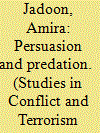| Srl | Item |
| 1 |
ID:
114933


|
|
|
|
|
| Publication |
2012.
|
| Summary/Abstract |
In 2002, Kenya's new National Rainbow Coalition (NARC) undertook to investigate and ensure the recovery of all public lands illegally allocated by the outgoing government. A Commission of Inquiry into the Illegal and Irregular Allocation of Public Land, chaired by the lawyer Paul Ndung'u, was appointed. The commission's report sets out the illegal land awards made to powerful individuals and families, provides important information about the mechanisms by which public land was misallocated, and shows how the doctrine that public land should be administered and allocated 'in the public interest' was consistently perverted. This paper explores what the Ndung'u report tells us about the role of the legal profession in the illegal and irregular misallocation of public land. It makes clear that the legal profession, far from upholding the rule of law, has played a central role in land corruption, using its professional skills and networks to accumulate personal wealth for itself and others. This stands in contrast to the role of the legal profession in promoting good governance and the rule of law envisaged by donors of international development aid. This paper focuses on 'local' land grabbing, and argues that the 'global land grab' or 'investor rush' needs to be understood alongside local manifestations of land privatisation.
|
|
|
|
|
|
|
|
|
|
|
|
|
|
|
|
| 2 |
ID:
164583


|
|
|
|
|
| Summary/Abstract |
Powerful states frequently employ foreign aid to pursue international security objectives. Yet aid's effectiveness will be undermined if it exacerbates the effects of conflict on civilians within recipient states. This article investigates how international development aid and U.S. military aid influence recipient governments' incentives and ability to target civilians. U.S. military aid has a persuasion effect on state actors, which decreases a recipient state's incentives and necessity to target civilians. Development aid flows, however, trigger a predation effect in some environments, exacerbating civilian targeting. An analysis of aid flows in 135 countries on civilian killings between 1989–2011 provides support for both the persuasion and predation effects associated with aid.
|
|
|
|
|
|
|
|
|
|
|
|
|
|
|
|
| 3 |
ID:
151275


|
|
|
|
|
| Summary/Abstract |
How do governments distribute their foreign aid resources across international development organizations (IDO)? We argue that governments’ distributional choices across IDOs derive from their attempt to minimize the costs of delegation and to pursue their own interests in foreign aid policy. Governments make decisions about the allocation of resources across a large number of IDOs, and they delegate their scarce aid resources to IDOs that pursue development policies in line with their own foreign development interests. We use data on the financial contributions of 22 OECD governments to 12 IDOs from 1970 to 2008 to test our argument. We find strong support for our claims. Governments regularly contribute to a large number of IDOs, and they tend to delegate more resources to IDOs that provide higher levels of portfolio similarity. The findings suggest that governments can benefit from the increasing complexity of the system of international organizations. It allows them to minimize the loss of control they experience when delegating sovereignty to international organizations.
|
|
|
|
|
|
|
|
|
|
|
|
|
|
|
|